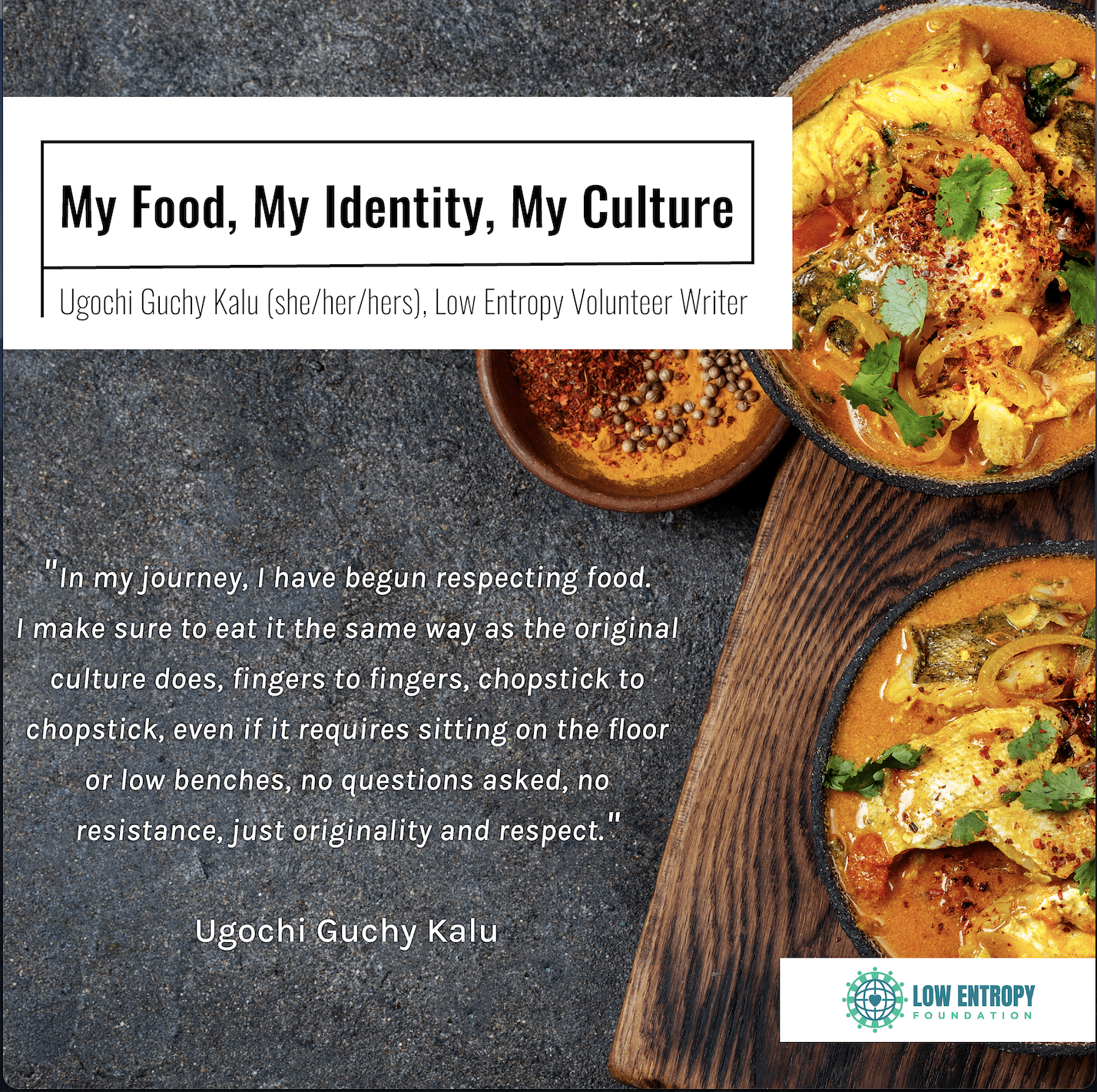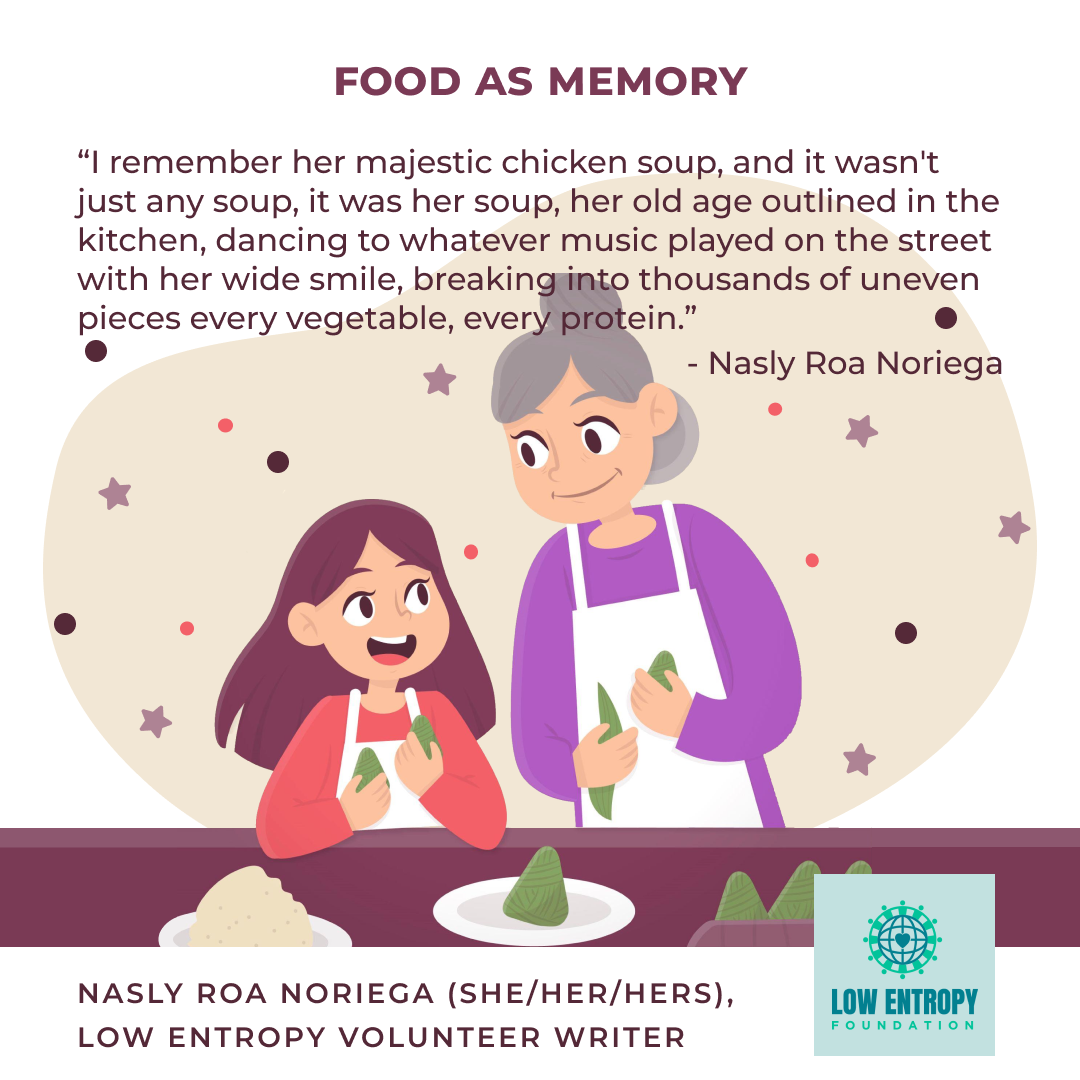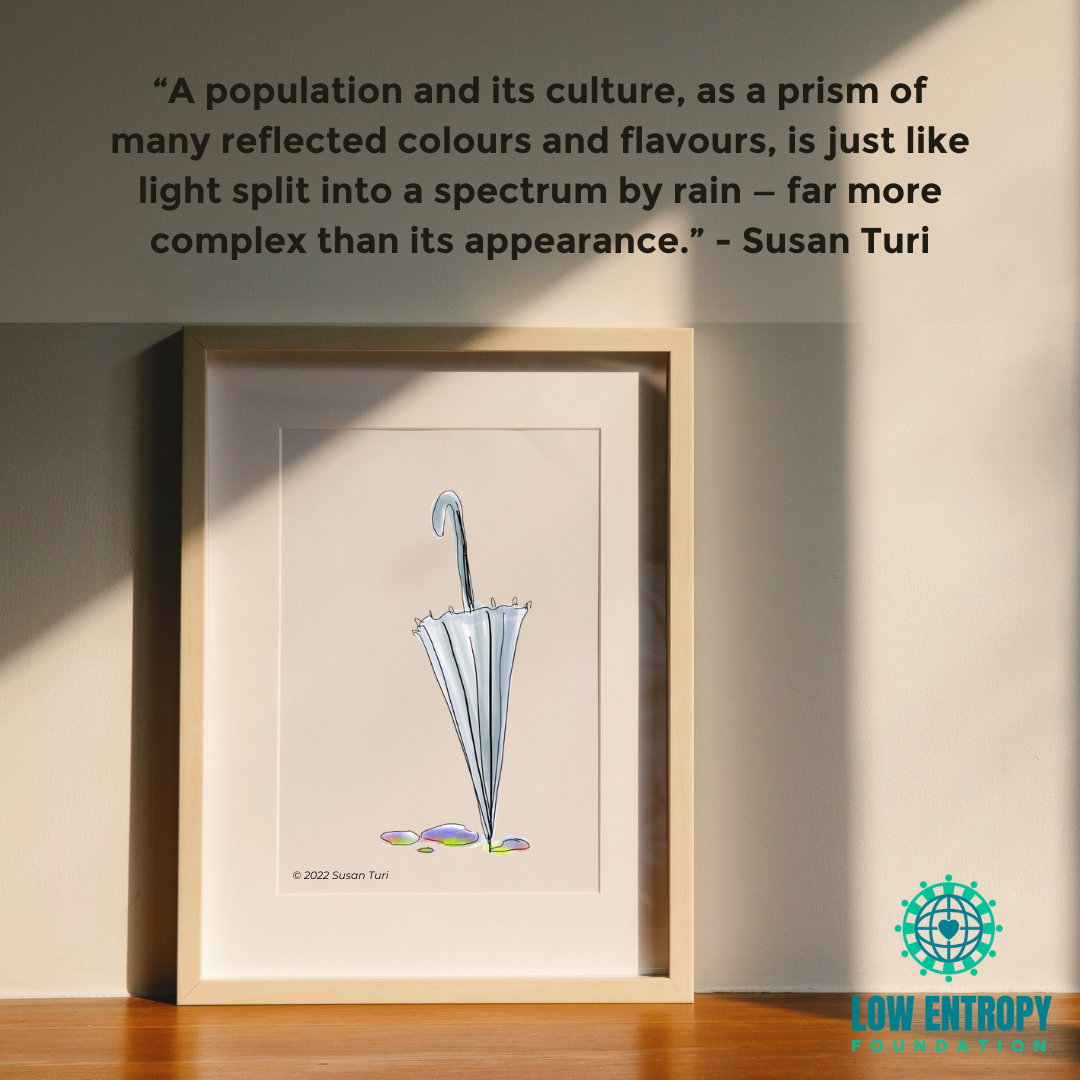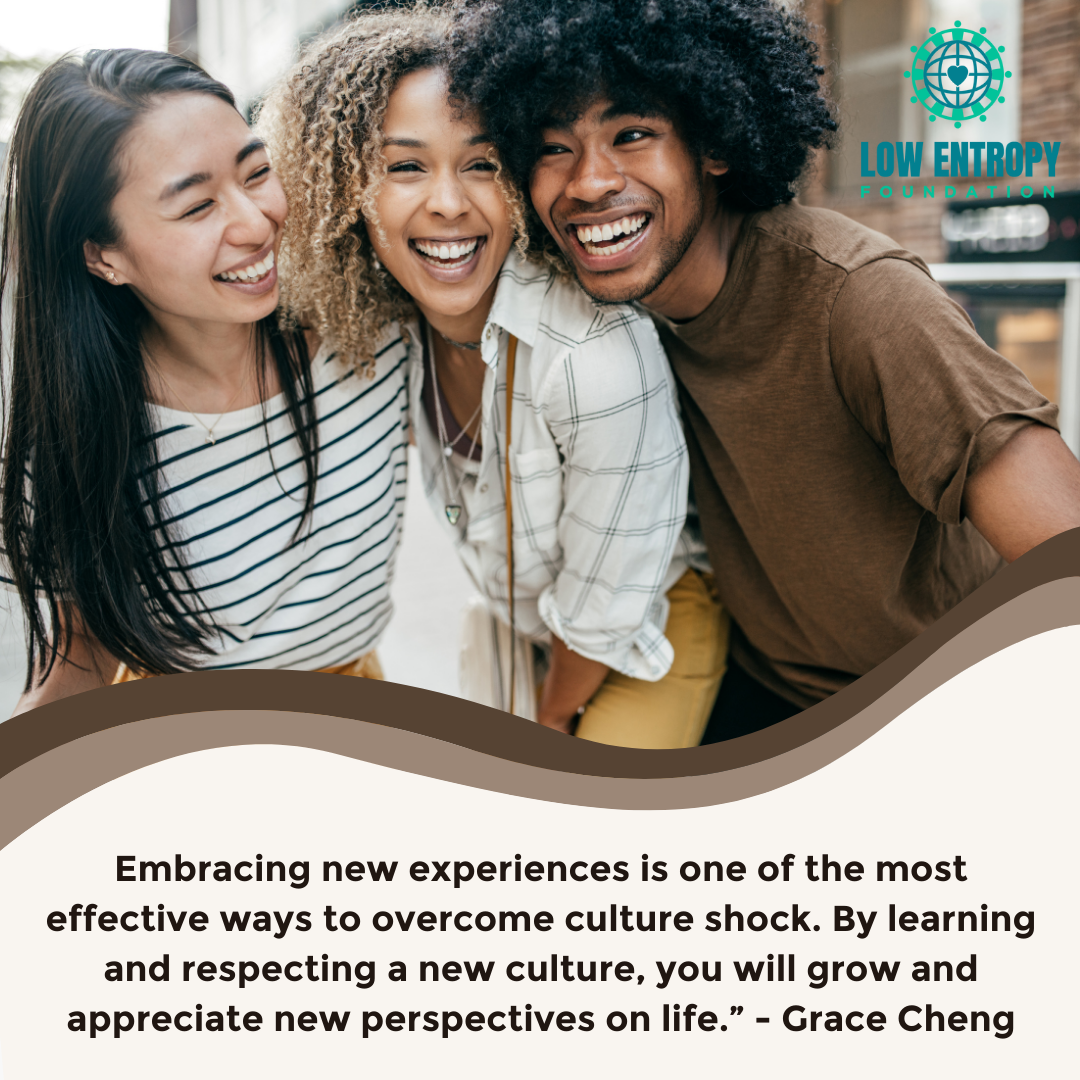My Food, My Identity, My Culture
May 28, 2023

Ugochi Guchy Kalu (she/her/hers), Low Entropy Volunteer Writer
We are who we are by design, race, ethnicity, color, belief, ideology, identity, class, environment and education. One clear mark of unity is in the food we eat and how we relish it. Food creates social bonds, as it simultaneously marks and supports cultural differences.
I have always admired myself as an open minded, receptive, warm and easy-going person, however, a recent event showed me a hidden side of me I never thought was still existent, let alone alive and kicking. I would always tell people that some behavioral tendencies in me had gone extinct, including my aggressive attachment to cultural heritage.
As a proud and deeply rooted African girl, I have and will always hold my cultural heritage to high esteem, celebrating the clothing, color, ideologies, beliefs, religions, continent, ancestral wisdom and, of course, food. As a global citizen, I began to see food as a necessity of life and not just culture. I would walk into a restaurant and order lamb shank from the Mediterranean, taas from Nepal, chicken biryani from India, chow mein from a Chinese restaurant and an original Italian recipe pizza from Viva la Sue. Of course, it was both food appreciation and, simply, food!
About a month ago, I was on a video call with my cousin, who lives in Beijing, China. It was one of our routine video calls where he showed me around the city, showed off his Mandarin skills and introduced me to a few of his local friends, who in turn invited me over for holidays. It was our ritual that started and ended happily with me living vicariously through his camera lens, while accepting my poor dexterity in using chopsticks. Well, until last month. That day, he called from a restaurant and was eating an African meal. It was vegetable soup with swallow, an expensive and highly celebrated soup that was only served to a groom’s family during wedding ceremonies after they had successfully completed the payment of dowry. It was the kind of soup that would be served during a chieftaincy ceremony to celebrate the amazing achievement of a true son of the soil. Imagine my surprise that this same soup was served casually in a restaurant, far from the roots of its ancestors. I was both shocked and jealous. My feelings jolted when I discovered the server was not Nigerian, or even African. I lost my cool!
How dare you betray our people? How dare you savor such a meal when it was not made by who owned it? I questioned my cousin, who laughed it off and told me to relax and mocked me for “acting deeply rooted and pro-Black.” Of course, it was no act. I was furious and demanded answers. Not long after, the server took a seat beside him and started to enjoy the food with him, and along came her husband, with whom she co-rans the restaurant. He was African and she was Asian, then my anger went from 100 to zero. It all made sense, the food was not violated, the culture was not watered down, it was only exported. I became more aware of my own tendencies and how much I have played down the importance and strength of my identity and that of others.
Often, we take lightly our own cultural heritage, and that of others. We treat food as a means of satisfying hunger and as a tool for indulgence in moments of craving. We might casually ask our Asian friends to share recipes for dumplings, ask our Nigerian friends to teach us how to make Ofe Ogbono or ask our Italian friends to share a pasta recipe. But it’s much more rare to pause and ask ourselves questions relating to the origin of said food, its relevance, and how to celebrate it and prepare it with respect.
I recently went into an African shop to pick up a food ingredient. It was my first time at that location and I was amazed to see all the items on display. They had food items I never imagined were possible to find in Canada. The fragrance of the shop felt like home, it truly felt like Africa and the nostalgia was quick to set in. As someone who had been away from home for a long time, I realized that home is not just a location, it is the people, food, feeling, festivals and celebrations, and generally what we make of it as individuals and a community. After my shopping, I went home, prepared one of my grandmother’s recipes, ravished it and appreciated my African-ness.
In an ever-evolving world, cultures are fundamental elements that continue to create identities and bind people together. Humans have learnt how to export their culture as they continue to migrate to disparate parts of the world in search of education, connections and greener pastures. These efforts made towards cultural exportation highlights its importance. In my journey, I have begun respecting food. I make sure to eat it the same way as the original culture does, fingers to fingers, chopstick to chopstick, even if it requires sitting on the floor or low benches, no questions asked, no resistance, just originality and respect.
As a great respecter of cultural heritage and, most importantly, food, I have been shocked on occasion since moving to Canada. I have twice experienced property owners demanding immigrants or renters from different cultures not to cook certain cultural food, as its strong aroma upsets them. My friend Shalini was banned from cooking Indian curry chicken as it was considered too strong, while I was banned from cooking goat meat, which is an essential ingredient for my cultural soup. I was not only shocked, but had to question the rationale behind such rules. Just an aroma that does not stick? Not an allergy? Not life-threatening reactions? I think banning certain food simply for disliking its aroma is not only harsh, but a disrespect and violation of others’ identity. In all honesty, I found it very absurd, unreasonable and discriminatory. I agree that some cultural food can have a strong aroma, however, tolerance, respect for others and equality should be the primary considerations. It is important that we make efforts to enlighten people on the power of cultural identity, respect and tolerance.
Indeed, food is nourishing, and also an aspect of identity that everyone should hold dear and close to their hearts. While we appreciate other cultures’ food, and remake and enjoy it, it is important to respect its origin, its meaning, and intentions behind every meal.
—
My name is Ugochi Guchy Kalu, and I am nothing without my cultural heritage and identity. I was born an Abiriba woman. I love my hometown, its culture and its people, and most importantly, I am thankful for all the nutritious meals that make up my heritage.
One thought on “My Food, My Identity, My Culture”
Leave a Reply
GET INVOLVED
At Low Entropy, we believe changing the world starts with changing ourselves.
Founded in 2015, Low Entropy Facilitates conversations that encourage diversity and promote inclusivity.
We understand that life can be confusing at times. It can seem challenging and sometimes you may feel like no one really “gets you.” We offer an opportunity to connect with others who have the capacity to understand you.










Such a powerful article! The connection between food, identity, and culture is beautifully explored. It’s a reminder of how our meals reflect our heritage and shape who we are. Thank you.